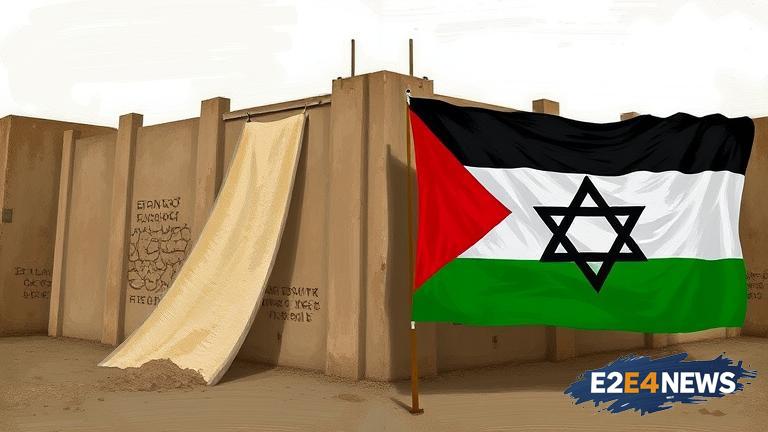The Israeli-Palestinian conflict has been a longstanding and complex issue, with various proposed solutions aiming to bring peace and stability to the region. One of the most debated solutions is the concept of a one-state versus a two-state solution. The two-state solution, which has been the dominant approach for decades, involves the creation of an independent Palestinian state alongside the state of Israel. This solution is based on the idea of partitioning the land into two separate entities, with each having its own government, economy, and sovereignty. However, this approach has been criticized for being unrealistic and unworkable, given the current political and geographical landscape. On the other hand, the one-state solution proposes a single, binational state that encompasses both Israelis and Palestinians, with equal rights and citizenship for all. This approach has gained significant traction in recent years, particularly among Palestinian activists and intellectuals. Proponents of the one-state solution argue that it is the only viable option, given the realities of Israeli settlement expansion and the fragmentation of Palestinian territory. They also argue that a single state would provide a more just and equitable solution, as it would allow for the free movement of people and goods, and would put an end to the system of apartheid that currently exists. However, critics of the one-state solution argue that it is unrealistic and would lead to the domination of one group over the other. They also argue that a single state would be difficult to implement, given the deep-seated divisions and mistrust between Israelis and Palestinians. Despite these challenges, many Palestinians and Israelis are increasingly advocating for a one-state solution, as they see it as the only way to achieve true equality and justice. The one-state solution has also gained significant international support, with many countries and organizations recognizing the need for a more inclusive and equitable approach to the conflict. However, the Israeli government has consistently rejected the idea of a one-state solution, and has instead pushed for a two-state solution that would maintain Israel’s dominance over the region. The Palestinian Authority has also been criticized for its support of the two-state solution, which many see as a betrayal of Palestinian rights and interests. In recent years, the Israeli-Palestinian conflict has escalated, with increased violence and tensions between the two sides. The conflict has also had a significant impact on the regional and global economy, with many countries imposing sanctions and boycotts on Israel in response to its human rights abuses. The international community has also been criticized for its failure to take decisive action to resolve the conflict, with many countries prioritizing their own interests over the need for justice and equality. Despite these challenges, there is still hope for a resolution to the conflict, and many are advocating for a more inclusive and equitable approach that prioritizes the rights and interests of all parties involved. The one-state solution is seen by many as the only way to achieve true peace and stability in the region, and it is an approach that is gaining increasing traction and support. However, it will require significant effort and commitment from all parties involved, as well as a willingness to compromise and work towards a common goal. The future of Palestine and Israel hangs in the balance, and it is up to the international community to take decisive action to resolve the conflict and bring peace and justice to the region. The Israeli-Palestinian conflict is a complex and multifaceted issue, and there is no easy solution. However, by prioritizing the rights and interests of all parties involved, and by working towards a more inclusive and equitable approach, it is possible to achieve a just and lasting peace. The one-state solution is not a panacea, but it is an approach that has the potential to bring about significant positive change, and it is an approach that is worth exploring and supporting. Ultimately, the future of Palestine and Israel will depend on the ability of all parties involved to work together and to prioritize the need for justice, equality, and peace. The international community has a critical role to play in this process, and it is up to governments and organizations around the world to take decisive action to support a more inclusive and equitable approach to the conflict. By doing so, it is possible to create a brighter future for all parties involved, and to bring about a lasting and just peace to the region.
